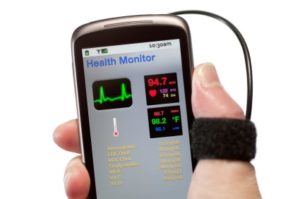 Mobile health (known as mHealth) technology has the power to transform the way Americans access medical care, and to radically reduce the costs of healthcare delivery. But the government is struggling to craft a regulatory framework that will ensure safety in this brave new world world of healthcare delivery.
Mobile health (known as mHealth) technology has the power to transform the way Americans access medical care, and to radically reduce the costs of healthcare delivery. But the government is struggling to craft a regulatory framework that will ensure safety in this brave new world world of healthcare delivery.
According to a report by PricewaterhouseCoopers (PwC), nearly half of patients and doctors “believe that the application of inappropriate regulations from earlier technologies is hindering the innovation of mHealth.” mHealth technology includes wearable devices, cell phone applications, remote monitoring tools, and telehealth technologies like video calling. Entrepreneurs are working to coordinate these tools to overhaul and improve patient care, but without appropriate regulations, the industry can’t accelerate as quickly as it otherwise might.
Protecting patient privacy
As technologies are developed and introduced in healthcare, entrepreneurs must find ways to integrate new tools with pre-existing ones. Encouraging “interoperability” between generations of telehealth and mHealth tools is vital for data sharing and coordination of care.
But data breaches are becoming alarmingly common, as more of our personal information becomes digitized. A bill passed in 2012, the “Healthcare Innovation and Marketplace Technologies Act,” aimed to prevent breaches of security by creating a system for government to work with entrepreneurs; it required the Department of Health and Human Services to start an mHealth developer support program to help entrepreneurs understand and comply with HIPAA laws and data privacy rules.
Another bill from 2012, the FDA Safety and Innovation Act (FDASIA), encouraged innovation by releasing guidelines on how to fast-track clinical investigations of medical devices. Both of these bills were designed to strengthen the mHealth platform’s ability to improve patient health.
mHealth’s potential
The Commonwealth Fund is a private foundation that works to promote a better and more equitable healthcare system. According to one of their studies, mobile health has the potential to transform healthcare for low-income, marginalized communities that have heretofore lacked access to proper healthcare.
“Cell phones and other consumer digital technologies have emerged as potentially powerful tools to engage patients in health care. They can strengthen the efficacy of safety-net health systems by improving providers’ capacity to reach vulnerable populations and actively engage them in their care,” the study reads.
Smartphones have become increasingly common in minority and low-income communities in the United States. Health interventions that take advantages of text messaging to “provide concise, timely and customized care-related information” can “promote self-management practices for chronic conditions, educate consumers about preventive care and personal wellness, and improve patients’ adherence with recommended treatment.”
The study concludes that while mobile health technology has major potential to improve health care, it cannot reach its full potential without “an improved understanding of the use of mobile health in patient care, as well as policies that provide funding, technical assistance, and reimbursement and address the issues of informed consent, privacy and security.”
In order to overcome the barriers to adoption of mHealth technology, the government must work with the medical system and with entrepreneurs to design regulations specifically adapted for the developing tools. Attempting to retrofit past regulations onto new models of healthcare delivery hinders progress in this important area of research and innovation. Without new regulations, entrepreneurship will stagnate, and the full potential of mHealth will not be unleashed.
For more information/questions regarding any legal matters, please [email protected] or call 310.203.2800.